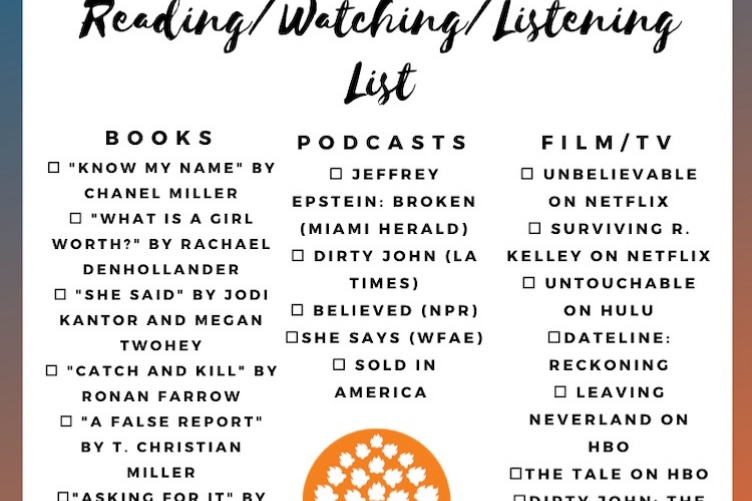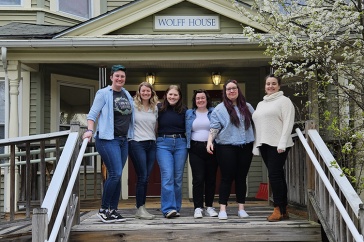
In the last few years, we’ve seen a dramatic rise in the amount of attention being paid to sexual harassment and assault. Some say the new era of believing came with the arrest of Bill Cosby, a man some saw as TV’s “model of fatherhood,” who sexually assaulted as many as 50 women (only those who have come forward with their stories).
Then came allegations against Harvey Weinstein, who paid off numerous women he assaulted and harassed dating back to the 1990s (typo here?). It was this case that helped ignite the #MeToo movement – a phrase coined years earlier by Tarana Burke – which continues today through the Time’s Up legal defense fund and other forms of activism.
As these issues slowly seeped into the mainstream, other forms of media hopped onto the topic too: in 2019, we have a wealth of new media to consume. Journalists Jodi Kantor and Megan Twohey – the women who broke the Harvey Weinstein scandal for the New York Times – recently wrote a book called She Said about how they did it. Ronan Farrow also wrote Catch and Kill about the tactics used against him to silence his reporting about the powerful Hollywood producer. We got a great Netflix show, Unbelievable that was sympathetic to survivors and showed a side of the justice system that isn’t addressed in popular crime dramas.
Here are just a few recommendations from the SHARPP staff of what we think you should be watching, reading and listening to this winter break. Please practice self-care as you view, as many of these recommendations can be triggering:
Amy Culp – Director
Hulu’s Untouchable is the inside story of the rise and fall of Harvey Weinstein. The documentary features interviews with survivors of Weinstein’s assault and harassment and reveals how, over decades, he acquires and protects his power even as scandal threatens to engulf him.
It is a powerful documentary about how people, like Harvey Weinstein, climb to gain power and how they wield that power once they are there.
Erica Vazza – Outreach and Training Coordinator
Spilled Milk is a memoir by interpersonal violence survivor and advocate K.L. Randis about growing up in an abusive household and her struggle through the justice system. Here is Erica’s review:
“This was one of the most moving & inspiring books I've picked up in a long time. It was recommended to my by a family member and given to me as a gift- and I'm so glad I made time to read it! This was a title I had only heard positive things about for a long time. Make time to read this story. It's beautifully written- and brings so much light to a subject that is typically kept in the dark. K.L. Randis' memoir is heart breaking and empowering all at once. It's an important story that is all to common within our world. And although it's difficult to read at points, we shouldn't shrink away from it. We need to TALK about interpersonal violence, because that's prevention of abuse and often times the starting point for healing for survivors. This is a must read. Lean in.”
Ally Poulin – Outreach Assistant
The Handmaid’s Tale takes place in a dystopian society where women are owned by the state and are forced to repopulate a country devastated by political turmoil and environmental disaster. Describing a nightmarish future that many of us see as not too unlikely, it shows how abuse and assault can affect how the mind works.
Julia Kelley- Vail – Direct Services Coordinator
Until this year, Chanel Miller was known only as Emily Doe in newspapers and media reports – she was the sexual assault victim of Brock Turner in the Stanford sexual assault case that drew the country’s attention. Turner was sentenced to only six months in prison and was let out after only three months for good behavior.
In Know My Name, her memoir about the assault, re-traumatizing trial, and her life after, Chanel Miller reclaims her voice. It is a powerful depiction of the strength and courage of survivors everywhere.
Isaiah Chisholm – Staff Advocate
Hannah Gadsby’s Nanette on Netflix
Not your “typical” comedy special, Nanette is largely about growing up as a gay child in conservative Tasmania where homosexuality was illegal, and how Gadsby carried that into her adulthood and ultimately her comedy career. It’s incredibly thoughtful and touching, and teaches you a surprising amount about art history.
Jordyn Haime – Marketing and Communications Assistant
NPR’s Believed
Incredibly detailed, empathetic, and truthful, NPR’s podcast Believed tells the story of how Olympic doctor Larray Nassar assaulted hundreds of young gymnasts and got away with it. This one gets a trigger warning like all of the other recommendations on this list: featuring survivor interviews, it’s painfully honest about how Larry abused girls and how systems meant to punish predators like him – including law enforcement at the university he worked for – remained complicit in his abuse.
But it’s also very hopeful: in one episode, we hear survivors read their victim impact statements to Nassar, including one survivor who said: "Little girls don't stay little forever. They grow into strong women that return to destroy your world."

















































